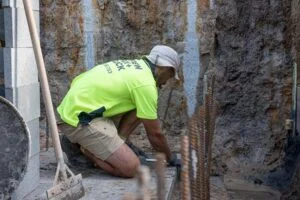The pros of using blocks are durable and long-lasting, resistant to fire and termites, and great energy efficiency, while the cons are higher initial costs, less versitility, and require skilled labour. Blocks also offer excellent sound insulation and low maintenance, making them a top choice for many projects. However, their heavy weight makes them more labour-intensive and limits design flexibility.
When considering blocklaying in Melbourne, weighing these pros and cons to see if such material suits your construction needs is essential.
In this blog, we’ll expand more on the pros and cons of using blocks on your property.
Pros of Block Construction
The following are the pros of block construction:
Durable and Long-Lasting
Blocks are incredibly durable, keeping structures strong for many years. They handle harsh weather without much wear and tear. Concrete blocks, in particular, are great at staying intact over time.
Resistant to Fire and Termites
Blocks are highly resistant to fire, which boosts building safety. Termites and other pests can’t damage block structures, making them a solid choice for long-lasting buildings. This resistance helps keep structures sound and reliable.
Great Energy Efficiency
Blocks have excellent thermal mass, which helps keep indoor temperatures steady. This means less need for heating and cooling, leading to lower energy bills. Using blocks in construction supports sustainable and cost-effective living spaces.

Cons of Block Construction
The following are the cons of block construction:
Heavier Handling and Installation
Concrete blocks are significantly heavier than bricks, which can make handling and installation more labour-intensive and time-consuming. This can also require the use of specialised equipment or machinery on site.
Less Versatility
Blocks are less versatile compared to bricks, offering fewer styles and limited flexibility in design. While bricks allow for creative architectural features such as curved walls and intricate patterns, blocks are more uniform and suited for straightforward structures.
Requires Skilled Labour
Block construction needs experienced tradespeople to ensure quality work. Skilled bricklayers and masons are crucial for precision and structural strength. Finding these specialised workers can be tough, and they often charge higher rates. Without the right skills, the workmanship might suffer, affecting the overall quality and durability of blocks and bricks.
Comparing Insulation Properties of Blocks vs. Other Materials
Here are the insulation properties of blocks vs. other materials:
- Blocks: Offer excellent thermal mass, helping maintain steady indoor temperatures. With additional insulation, they can match or exceed the performance of many other materials.
- Timber: Naturally insulates well but may not provide the same level of durability and thermal mass as blocks.
- Brick Veneer: Provides good thermal resistance, but blocks with added insulation can achieve similar or better results.
- Steel Framing: Lacks natural insulation and needs significant additional insulation, unlike blocks with inherent thermal properties.

